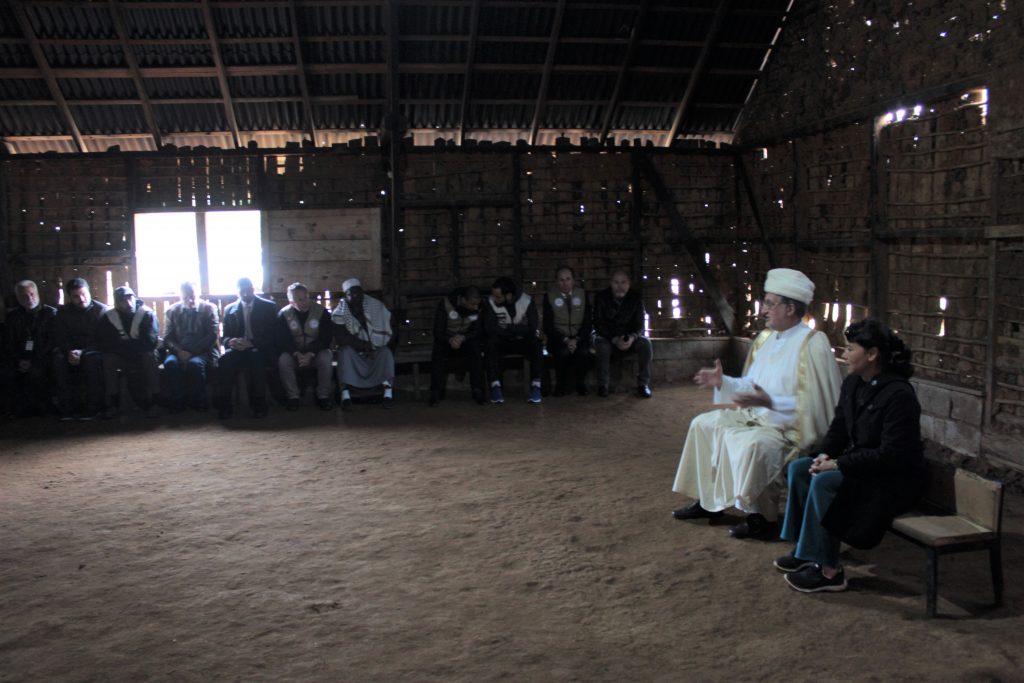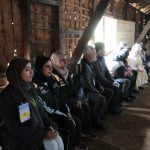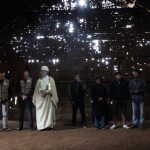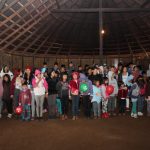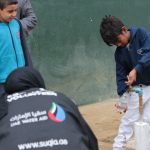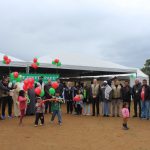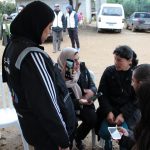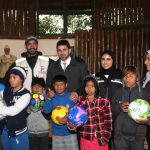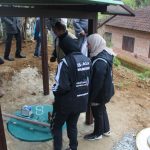São Paulo – Outside the prayer house in the Tenondé Porã Indian settlement, near Parelheiros, in the far south zone of São Paulo, Brazilian indigenous leaders greeted a delegation of Arabs and ushered them in. There, representatives of the Mohammed Bin Rashid Al Maktoum Global Initiatives from the United Arab Emirates stepped for the first time into Guarani territory.
With financial support from the Arabs and the UAE Consulate General in São Paulo, the Federation of Muslim Associations in Brazil (FAMBRAS) delivered two water purifiers and a water treatment station that will serve the indigenous community. These works brought together Arabs, Brazilians and Guaranis on Sunday, August 4.
In the coldest afternoon of the year, Parelheiros recorded a peak temperature of 12°C. “We’d like to thank your visit despite the cold weather. It’s an honor for us to receive you. My name is Adriano; in Guarani, it’s Karai Poty. We’re here at the Tenondé Porã settlement, which gives its name to the territory. We have always been here, hidden away. The city has grown more and more each day and it has swallowed up our territory, and not the other way around, as lots of people say. Although we live here in São Paulo, inside its territory, we only speak Guarani among us. Every child, teenager and adult,” said Karai, one of the four leaders of the settlement.
(Story continues after photo gallery.)
Tenondé Pora lands consist of eight villages. When welcoming visitors, Guaranis make an exception by speaking Portuguese. On the other hand, Emiratis spoke Arabic among them. With the help of translators and some patience, the Portuguese language was used to connect visitors and visitees.
Inside the house, the children of the village sang hand in hand, stomping their feet at the same rhythm. A Guarani choral of over 100 child voices. “The first song talks about doing things together,” explained Karai Poty.
The territory is home to 2,500 people with a history of struggle. The 38-year-old Jera Guarani is also a leader and, in her speech, she thanked the Arabs for their presence and talked about her own history. “This is a prayer house where people from the village get together. We’ll talk about something that most Brazilians already know: we’re natives from this territory, but now we live in small portions of a huge territory, which was previously ours. Then Brazil was invaded by the ‘juruá,’ who took what was ours. So, we stayed in very small areas for many years,” she said. ‘Juruá’ is Guarani for “those with hair around the mouth” and is one of the names for non-indigenous people, in a reference to the first Europeans that arrived in Brazil.
Recovering land and tradition
Jera graduated in Pedagogy from the University of São Paulo (USP), decided to return to her village and was one of those responsible for strengthening their traditions. In 2018, she came up with the idea to create a council to work together and, since then, she has been one of the leaders of the village, which is home to 170 families. “Two years ago, I left my career as the village’s pedagogue to become a guarani farmer,” she explained about another part of her work.
Farming was key for them to recover part of their lands. “After 70 years living in small areas, we now live across almost 16,000 hectares. Now, after losing so many things in our culture, we can say we have more than 50 cultivars of sweet potatoes recovered within ten years,” Jera told the Arabs, with help from the translation. They answered by thanking the “warm welcome” and the explanations, and saying they were delighted with the children’s “lovely” song.
In May 2016, a decision by the Ministry of Justice about the Indigenous Land Tenondé Porã approved the limits of almost 16,000 hectares which have been claimed by its leaders for more than 30 years. With the area increase, the indigenes could resume the planting of ancient crops more intensely. Besides the 50 cultivars of sweet potatoes recovered, they plant different species of corn, cassava, peanuts, and sugar cane. “We have all the varieties that could be produced here. [Productivity] increased because, you see, before we used to have only 27 hectares and 1,500 people, each in their own little house; we didn’t have the space to plant. Now, after recovering our land, in the new villages that were formed there’s room for planting. We have the territorial council and the land usage regulations; if I want to plant in another village, I can,” said Karai.
Now, over 1,200 people live just in the main village, and instead of one chief, they have four leaders: two women and two men. “Most villages have one chief. Here we have a universe of people, each with their own ideas. So, to meet the largest possible number of demands, we found it was best to have this kind of organization,” Karai explains. “It could be four men or four women. It doesn’t matter. That’s not a problem. All it takes is for them to have a leadership profile. They must know how to talk to outside leaders and how to stand up for us in some cases,” he stresses.
Indigenes also have the right to change
“But how can a native not use a headdress?” is a question Guaranis are still asked. To this, Jera and Kari answer jokingly but firmly. “One of our roles as leaders is to convey this message: Just like the Portuguese at the time of the invasion wore different clothes, we also have the right to change. And it was not by choice; we were obligated to wear clothes at the time of the slavery. The so-called Jesuits were those who enslaved the natives. First the Jesuits, then the Bandeirantes, who are know seen as heroes in the city of São Paulo. Indeed, the governor’s palace is called Palácio dos Bandeirantes. History doesn’t tell you how the Bandeirantes and Jesuits slayed and enslaved the natives. Many indigenous peoples don’t speak their language anymore because of the prohibition by the Church,” he says.
There are two schools in the village. Ceci/Ceci Tenondé Porã is attended by native children from 0 to 6 years and teaches culture. “It’s just a tradition. We teach kids about the planting seasons, the hunting seasons. Because we have these divisions: for example, there’s a season when we’ll mostly plant and a season when we’ll mostly hunt. Because we’ll let the soil rest for some seasons. We teach all of this to the children: what moon phase we plant in, how we control the plant species so they don’t get mixed. Corn, for example, has many species and we don’t plant them all on the same day, so they won’t all bloom together,” Karai tells.
For him, the culture school is important, but it’s also the scar from a broken history. “The way I see it, it’s very good, but it would be better if we didn’t rely on that school. If we could live as we used to before. If we could pass on the teachings in a traditional way. If we hadn’t so much outside influence,” said Karai, pointing out that the traditional teaching used to be something learned in the bosom of each family. On the other hand, the teaching is different at the state school for children over six, covering both Guarani culture and the non-indigenous education, including learning how to read and write.
Water and autonomy
The connection with FAMBRAS occurred first through the subprefecture. “We said we wanted a direct contact. We know how to negotiate, listen and talk, so we had our first contact with them. This is the first time people from the UAE come to the village, but we already received other tourists, American and Spanish,” Karai said.
The connection yielded the donation of two water purifiers, installed near the Vera Poty Basic Healthcare Unit (UBS), and a water treatment station that will meet the demand of the state school, which receives 350 students. Both are in the main village.
The FAMBRAS delegation included two engineers from Mohammed Bin Rashid Foundation’s UAE Water AID. Aisha Alnnaimi is 23 and works to come up with solutions to bring drinking water to Arab communities and other countries. This was her first visit to Brazil. She was curious and sat next to the Guarani leader Jera to ask some questions. “It’s different when you do this kind of work; all you do is calculate the numbers and everything. But when you see the real communities and how they are benefiting from our solutions, your views change. It puts how you think and see the world in a different perspective,” she said, excited about her chance to try Brazilian açaí and guarana, and about the cold weather, which is unthinkable for someone who lives under temperatures of 49°C.
Tenondé Porã has 110 houses with conventional bathrooms, built with support from the state government. “We have 110 bathrooms, which put the village in a reality of open sewages that pollute,” Jera explained. UBS manager Lucimar Constantino explains the benefits of these works. “Water now comes from artesian wells. Before, we had fewer inhabitants, more people meant respiratory problems, parasitosis, and diarrhoea,” she explained.
Despite the assistance received, Jera that explained the community needs more. “Our idea is to spread out even more over the large area we have conquered, so that we can have clean, natural water from the springs,” she said.
Then, what is the main demand, what do the indigenes want? “That the indigenes are not looked upon as victims. Help us be independent; I think that would be a real help. It’s obviously a very large village, we struggle and have urgent needs. A food basket is always welcome for a more deprived family and we’ll always say thank you. But I think that bringing some project, some autonomy within the communities is a [better] way of helping,” Karai stressed.
Just like the Arabs, who took many pictures of the Tenondé Porã land, there are many others interested in visiting. Therefore, the Guaranis came up with a tourism plan. “We had several territorial meetings with other villages to figure out how we want tourism. We don’t get more than a bus per day, because the tourist must leave with an understanding of how the village works. We try to demystify the non-indigenous vision. When they (the tourists) come, they usually expect to see a naked, painted indigene with a headdress. That’s not the image we want to convey,” he explains.
The idea is also to avoid predatory tourism. “If we get visits every day, how long will nature take to recover? When would we do our prayers, our songs? We would virtually live off tourism and forget our religion, singing and dances,” Karai concluded.
Read more about the Arabs’ visit to Parelheiros on Friday (9) on ANBA.
Translated by Guilherme Miranda



